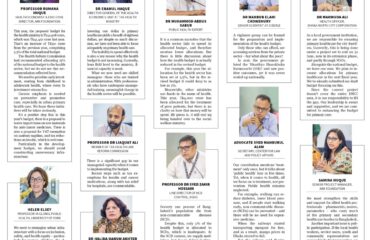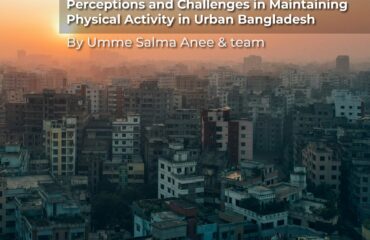Abdullah Muhammad Rafi, Shakhawat Hossain Rana
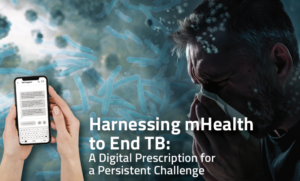
Let’s start the story with a few numbers. First of all, every year, 379,000 people in Bangladesh are newly affected by Tuberculosis, that’s more than 1,000 cases a day, and out of the almost four hundred thousand patients, more than 44,000 people die each year. Imagine losing 3,600 people a month to a disease that we already know how to treat. These realities of TB, a deadly yet preventable disease, have put Bangladesh in 6th place globally, a position no country wants.
Despite efforts by government, non-government, and international agencies, the surge of TB in the country hasn’t come under control. In fact, according to a report published in The Daily Star, Bangladesh is unlikely to meet its 2025 targets of a 50 percent reduction in the tuberculosis incidence rate compared to that of 2015. These targets were adopted under the WHO’s End TB Strategy in 2015, but the country is struggling to reduce the incidence rate of this contagious bacterial disease.
If we analyze the TB-related data, it becomes clear that efforts to combat TB require some policy-level changes. The traditional approaches to dealing with this bacteria-borne disease have not been very effective, and this is where the concept of mHealth comes in. mHealth, or mobile health, is the use of mobile technologies like smartphones and apps to support healthcare and public health objectives. It encompasses a wide range of applications – from providing health information and coaching to facilitating telemedicine and managing chronic conditions. mHealth aims to deliver healthcare more efficiently, conveniently, and accessibly, especially in underserved areas.
Bangladesh is one of the pioneer countries to introduce mHealth services to tackle TB. As mobile access expands across the country, mHealth is quietly reshaping how we detect, monitor, and treat TB. It offers the opportunity to bring care closer to people, instead of making people chase after care.
The World Health Organization (WHO) has recommended SMS-based programs for TB patients as a standard, user-friendly, and cost-effective method to ensure medical adherence and facilitate information sharing. Collaborating with WHO, researchers developed an mHealth smoking cessation package called mTB-Tobacco, through which TB-related messages can be delivered via SMS to the mobile phones of patients. The ARK Foundation, in collaboration with the University of Edinburgh, initiated this mHealth intervention under the umbrella of the NIHR-funded RESPIRE program.
The Promise of Digital Interventions
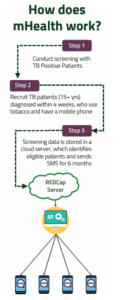 The mTB-Tobacco project is already showing great results in Bangladesh, a country with more than 192 million mobile-phone users. Patients receive gentle SMS reminders to take their medications, and these small nudges help them stay on track through the long, demanding months of treatment. The mHealth solution, which includes not only patients but also the lifeblood of the healthcare sector, community health workers (CHWs), has breathed new life into the TB-prevention effort., as health workers now use mobile apps to register cases and follow up with patients, detecting problems before they turn into crises. In rural parts of the country, where medical facilities and doctors are scarce, digital platforms enable consultations across distances that would otherwise consume more time and money.
The mTB-Tobacco project is already showing great results in Bangladesh, a country with more than 192 million mobile-phone users. Patients receive gentle SMS reminders to take their medications, and these small nudges help them stay on track through the long, demanding months of treatment. The mHealth solution, which includes not only patients but also the lifeblood of the healthcare sector, community health workers (CHWs), has breathed new life into the TB-prevention effort., as health workers now use mobile apps to register cases and follow up with patients, detecting problems before they turn into crises. In rural parts of the country, where medical facilities and doctors are scarce, digital platforms enable consultations across distances that would otherwise consume more time and money.
One research project that brings this potential to life is Quit4Tb Trial. This project, led by the ARK Foundation, is a behavioral intervention research program designed to assess the effectiveness of mobile-based messaging in improving TB treatment adherence. This initiative merges mobile technology with behavioral science to support TB patients in completing their treatment. Patients enrolled in the program receive carefully crafted, culturally relevant messages that remind, encourage, and motivate them to stick to their medication schedules. But the innovation doesn’t stop at the screen, QUIT4TB also empowers health workers to follow up when doses are missed, offer guidance, and build relationships rooted in trust.
Early results from the project suggest that even simple digital tools, when thoughtfully designed and humanely delivered, can significantly improve treatment adherence. They also underscore an important lesson: technology alone isn’t the answer; technology in the hands of caring people can be transformative.
Turning the Tide with a Text: Israfil’s TB Journey
To better understand the context, we reached out to Mr. Israfil (pseudonym), a 32-year-old former smoker and recent TB survivor. Israfil, who lives on the outskirts of Dhaka, was diagnosed with TB in 2024. After experiencing several months of persistent coughing, he initially visited a local pharmacy, thinking it might be related to seasonal flu. But as the symptoms continued, he went to his nearest general hospital, a secondary healthcare facility, where he was advised to take a sputum test, and the result came back positive for TB, marking the beginning of his journey.
Mr. Israfil admitted to being a chain-smoker at the time, smoking more than 20 cigarettes a day. Once the treatment regime began, he tried to cut back. Speaking with us, Israfil said, “I used to smoke my first cigarette before breakfast. During my treatment, I continued this practice for the first few days. But the moment I lit the cigarette, I received my very first text message warning me about the dangers of smoking during TB treatment. At first, I ignored the messages. But over time, I started to understand the gravity of the disease and began to follow the instructions in the texts.”
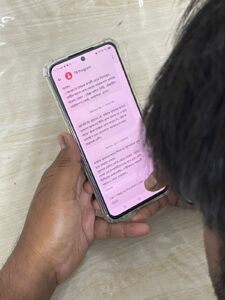 The text messages, developed by the World Health Organization (WHO), were delivered locally through ARK Foundation researchers using a sophisticated yet well-designed software called mTB-Tobacco. The messages were scheduled and sent at different times throughout the day while the content of the messages ranged from smoking cessation support to motivational prompts encouraging patients to take their medication on time. Since TB treatment is more complex than many other medical regimens and requires consistent adherence, these reminders played a critical role in keeping patients on track.
The text messages, developed by the World Health Organization (WHO), were delivered locally through ARK Foundation researchers using a sophisticated yet well-designed software called mTB-Tobacco. The messages were scheduled and sent at different times throughout the day while the content of the messages ranged from smoking cessation support to motivational prompts encouraging patients to take their medication on time. Since TB treatment is more complex than many other medical regimens and requires consistent adherence, these reminders played a critical role in keeping patients on track.
Returning to Israfil’s story, a father of two, he shared that he began giving up smoking after reading the messages regularly. The texts included messages about family dynamics, and according to Israfil, that’s what hit him the most. In his own words, “I could harm myself, but I could never hurt my family members. That’s what I kept thinking. After I got the confirmation of TB, I even stayed away from home for two months so no one else in my family would get infected.”
Israfil, who works for a marketing agency, offered a very unique perspective: he said the text messages felt like receiving daily marketing directives from his boss. He explained that the strict medicine regimen, combined with these daily “therapies,” sparked a significant change in his mindset.
The ARK Foundation, through its QUIT4TB project, is helping turn such once-unimaginable changes into reality. So far, the project has enrolled more than 600 patients across 15 sub-districts in Bangladesh, testing whether SMS-based messages about TB can improve treatment adherence. Now in its second phase, the QUIT4TB research team is hopeful that more promising results are on the horizon.
The Challenge of Sustainability
Though there are a number of success stories involving mHealth in a low- and middle-income country like Bangladesh, too many digital health solutions remain disconnected from the systems that could sustain them. Many mHealth interventions are small in scale, reliant solely on donor funding, and not integrated into national TB programs. Inconsistent internet access, lack of training, and limited digital literacy, especially among older patients or those in rural areas, continue to pose serious challenges.
Moreover, in a context where TB still carries stigma, the question of data privacy becomes crucial. Patients must feel confident that their personal information is safe. Without robust protections and ethical frameworks, digital health tools risk doing more harm than good.
In the end, in a country where poverty is an unfortunate reality, the spread of diseases like TB was almost inevitable. Urban areas are overcrowded, with far too many people living in very limited spaces, and the country’s healthcare system remains weak and under-resourced, yet, there is hope, as 90% of TB patients can recover if diagnosed early and treated properly. The other 10%? Many suffer in silence; either undiagnosed, misdiagnosed, or reached too late for effective intervention.
Globally, 8 million people die each year due to tobacco use. In Bangladesh alone, tobacco kills 150,000 people annually with more than 400 deaths every single day. Smoking doesn’t just cause cancer, it also weakens the lungs and immune system, making people far more vulnerable to TB.
That’s why it is essential for the government, as well as non-government and international agencies, to address the gaps in the healthcare system, so that patients and their caregivers know how to respond to this life-threatening disease effectively.
Written by Abdullah Muhammad Rafi (Stakeholder Engagement Champion for RESPIRE), and Shakhawat Hossain Rana (Junior Research Associate of ARK Foundation)

